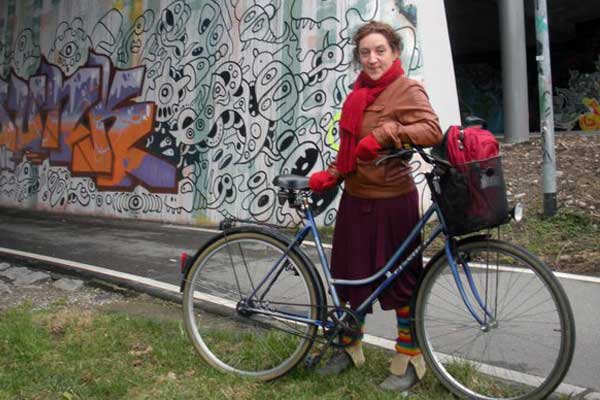
Exploring Christianity and capitalism in Colombia
Published: June 11, 2013
With an eye to developing globally oriented thinkers and innovators, the W. Garfield Weston Doctoral Fellowship Program provides 16 Canadian graduate students from the University of Toronto with a travel award to further their research, broaden their skills and expand their networks in an international setting.
Available to Canadian students across all fields—the humanities, as well as the social, physical and life sciences—The Weston Fellowship is Canada’s only fully-funded award program dedicated to international research at the doctoral level. A Weston Fellowship will cover a year’s tuition, the expenses of international travel, a living stipend, and travel within the destination country for U of T students who are entering the third or fourth year of their doctoral program, and plan to do research outside of Canada.
Rebecca Bartel is one of the 16 students receiving a Fellowship this year. (Read a Q & A with Shaun Cleaver; read a Q & A with Carrie Demmans Epp.)
U of T News asked Bartel about her work and the significance of the Weston Fellowship.
Tell us a little about your research
I am interested in how economic and political factors shape Christian landscapes and vice versa. In concrete terms, my research focuses on how Christians use credit and how the logic of prosperity forms a particular regime of Christian practice.
The question of the relations between Christianity and economics has been addressed by some of the most important thinkers of the last centuries, from Feuerbach to Foucault. What has, however, been missing is a study of the ways in which Christians believe finance into being and how people are formed by finance – a financial subjectivity. What is at stake? What is at risk? And what are the hopes and dreams of people in their use of credit cards, bank accounts, as well as alternative economic systems, in this emerging economy in Colombia?
These are the questions that guide my research. My research into finance and religion contributes to cutting-edge scholarship, as well as to on-going grassroots work being done on themes of financial inclusion, credit and debt in Colombia and around the world.
What drew you to this field?
After completing my undergraduate degree, I moved to Bogotá, Colombia for a graduate program in Armed Conflict Resolution and then a Master’s degree in Political Science which focused on the political economy of war.
During and after my studies, I worked with different non-governmental organizations (NGOs) national and international, in community development, political analysis and human rights advocacy. The issue of economic justice became a very important element of my thinking and my work as a scholar and as an activist.
Much of my work with the NGOs centered on questions of Free Trade Agreements, the effects of the extractive industry, and the gross inequalities of wealth between and within the Northern and Southern hemispheres of the Americas. Studying the history of capitalist development in Latin America, I learned of the ways in which an economic model – what some call neoliberalism – was violently imposed in Latin America. Beginning with the Pinochet dictatorship in Chile, to Operation Condor in Argentina, Uruguay, Paraguay, and Brazil, to the civil wars of the 1980s in Central America, to the ongoing war in Colombia, these wars fought ostensibly against communism also were fought in favour of this form of capitalism.
With so much human suffering in the wake of economic reform, and even now, in the aftermath of one of the most significant financial crises of this century and the last, I began to wonder how it is that we have come to believe that the ways in which financial institutions have been developed and the way that financial systems are being implemented, are the only ways.
Christianity and capitalism have a long and complex history. In Colombia, Christianity is a powerful force and has changed dramatically over the last 20 years. I want to investigate the ways contemporary religiosity and political economy are entangled in the particular context of an emerging economy.
What drew you to U of T?
The University of Toronto, specifically the Department for the Study of Religion, is one of the most exciting places in the world to study contemporary religions from a multidisciplinary perspective. Stacked with world-renowned experts in the Anthropology of Religion, Religion in the Americas, and Political Theology, the Department offered the unique opportunity of working with and learning from some of the most interesting, cutting-edge thinkers in the field.
The opportunities for research fellowships, conference participation, colloquia and research funding were also important factors in my decision to apply to the University of Toronto. The possibility of undertaking a collaborative program between the Department for the Study of Religion and the Center for Diaspora and Transnational Studies was also of great interest for me. There are many options for collaborative PhD programs in Religion, which serve to demonstrate again the notable inter-disciplinary focus of the Department.
At the University of Toronto I have been nurtured, challenged, and encouraged to push my thinking and my scholarship to new limits.
What does the Weston Fellowship mean to you?
This fellowship will allow me to extend my time in Colombia, amplifying my research data and experience in Bogotá. It gives me the freedom to creatively pursue my research with a renewed rigorousness. This Fellowship indicates to me the importance of considering the ways in which religion, economics, society, and history fold into each other and the potential significance that inter-disciplinary research on the constellations of finance and religion may have for our current political and economic climates.
With this Fellowship, I will be able to form a small research team of students from the university where I am currently teaching (Universidad Nacional de Colombia). This research team will help me in the work of transcribing, gathering data, and bibliographic work and will benefit the students in their academic development and research skills.
Furthermore, the fellowship will allow, indeed I feel it encourages, me to continue community-based work with vulnerable populations in Bogotá. The generosity of the Weston Foundation in the establishment of this Fellowship is gratefully acknowledged and very much appreciated.



